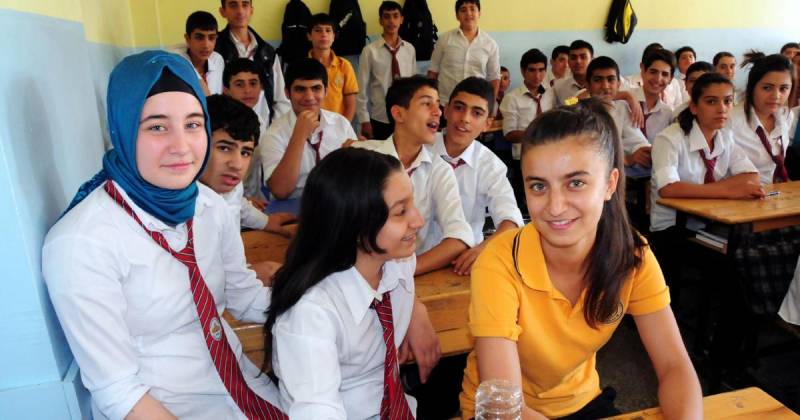The new school year has started in Turkey with 25 million students, 17 million of them below the age of 18. We do not know the number of students who identify as non-Turkish, in terms of ethnicity, as the country’s censuses no longer ask the question. According to different sources, between 17 and 22 percent of the population is Kurdish, while 7 to 12 percent belong to other minorities. According to the Turkish Statistical Institute, the population of Turkey was 80 million in 2017.
In a country where nearly 20 million people identify as non-Turkish, education is in the Turkish language. This has serious effects on the educational landscape, especially in the mainly Kurdish southeast. When the mother tongue is different to the official language of learning, educational achievement is often low. The number of children dropping out of school is high in the Kurdish region. Kurdish children struggle because of poor communication, because of stigma and marginalisation, passive attitudes and problems with self-confidence. As a result, they are rarely able to develop their full potential.
According to 2009 research within the Kurdish-speaking population, 46 percent have not completed primary education, which accounts for 9 percent of the Turkish population as a whole. Some 37 percent of the Kurdish-speaking population is illiterate. For Kurdish women, the numbers are even worse – 80 percent of Kurdish women are either illiterate or did not finish primary school.
After the ruling Justice and Development Party (AKP) came to power in 2002, there were some developments in the use of Kurdish. A Kurdish language television channel was established in 2009 and Kurdish teaching departments were established in a few universities. In 2012, Kurdish language courses were allowed in schools as an elective, though this was never widely implemented. In each Kurdish city, a few schools were selected for optional two-hour Kurdish lessons, but classes never began as officials said there was either a lack of teachers or lack of demand.
Across the Kurdish region, there are two or three schools that provide the two hours of optional Kurdish lessons each week. The government uses these schools to show foreign officials how democratic Turkey is when they visit the region. After the declaration of the state of emergency in July 2016, Kurdish language teaching departments in universities were closed, NGOs working on the Kurdish language were closed, Kurdish names were erased from our cities, and everything concerning Kurdishness was criminalised once again.
Last weekend, Kurdish parties in Turkey met in Diyarbakir and established a Kurdish Language Platform. After the workshop, they released a statement: “Education in the mother tongue is one of the fundamental human rights and there are more than 25 million Kurds in Turkey. As citizens of Turkey, Kurdish people demand that the Kurdish language be a language of education from primary school to university.”
Today, millions of Kurdish people, like me, have been educated in Turkish schools and do not know their mother tongue. I remember how I was ashamed when my teacher told me that “Kurdish is bad and people who use the Kurdish language are bad”. I remember correcting my mother as a child when she used Kurdish words. I did not want her to be a bad person. In my generation, millions of Kurdish children have been unable to develop close relationships with older relatives, sometimes even with their parents, because of the language barrier. As they taught us in school, we wanted to be Turkish, proud and good.
It is so sad to see that after 30 years, we are still in the same situation. Nothing has changed for Kurdish children. I know how they feel. There is a loss of connection: no past, no family history because you do not understand each other. On the one hand, you have a large family, but on the other you are strangers because you cannot communicate.
Two weeks ago, Education Minister Ziya Selçuk told a press conference that Turkey needed teachers who knew both Turkish and Arabic, to help educated the country’s the 3.5 million Syrian refugees. I asked him on Twitter: “There are millions of Kurdish students, does this country not need teachers who know Kurdish?”
Of course, he did not respond.
